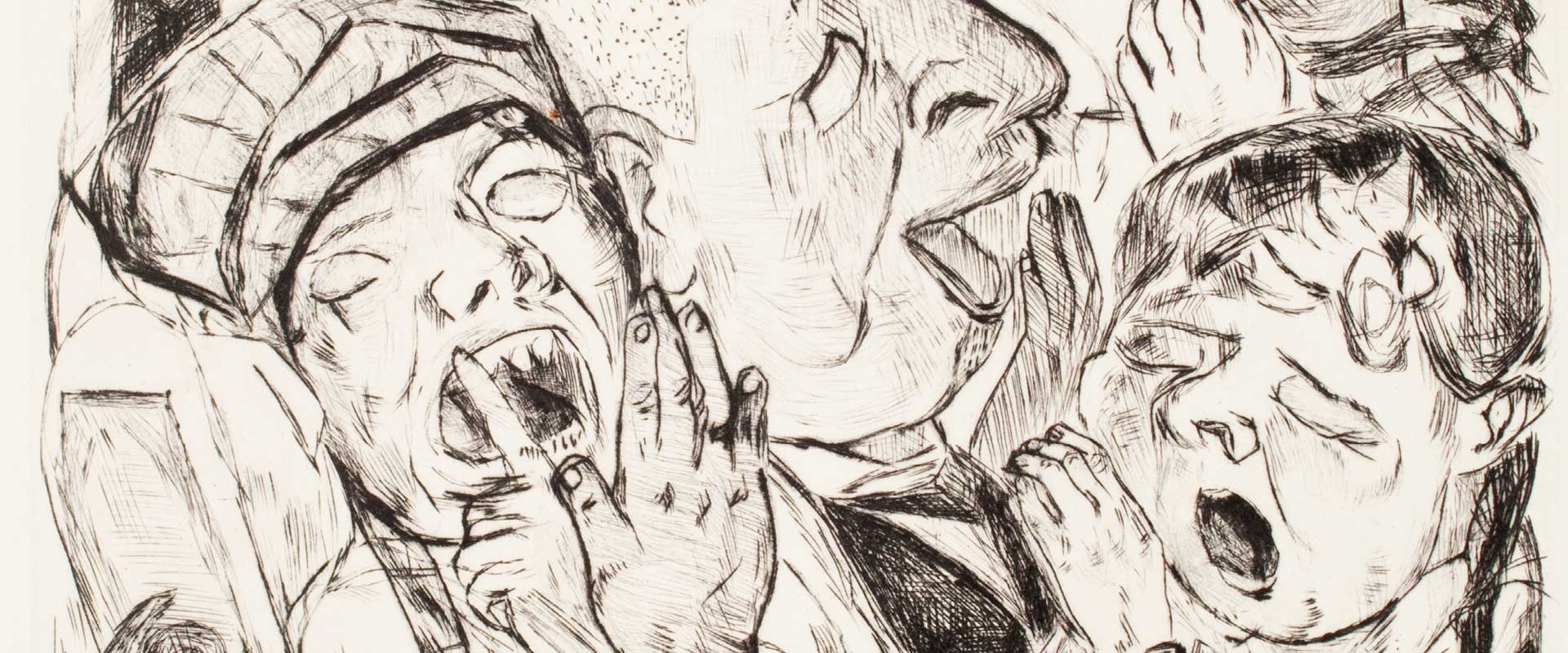February 24 – June 4, 2023
EXTENDED BY POPULAR DEMAND TO AUGUST 20
Under the control of the Nazi regime, works of art across Europe were confiscated in the thousands. Some were destroyed; some were sold to help build their war machine; others were used as propaganda, promoting the idea that certain perspectives and people were ‘degenerate’ and ‘unworthy of life’.
This exhibit tells their story.
About the Exhibit
Between the end of WWI and the Nazis’ rise to power, the Weimar Republic era was a period of social, economic, and political upheaval in Germany and of thriving cultural and artistic experimentation. Modern Art, which cut ties from ridged tradition and promotes freedom of expression, was rising in popularity with new movements like Dadaism, Cubism, Expressionism, and Abstraction taking strong footholds in German society.
Hitler did not approve. He deemed modernist tendencies to be the result of genetic inferiority and society’s moral decline, labeling the artists and their work as Entartete Kunst, or ‘degenerate’.
An unprecedented attack to change and cleanse Germany’s cultural landscape was unleashed – a key step in Hitler’s plans for racial cleansing. Featuring art from private and institutional collections, this exhibit explores the Third Reich’s use of modern art as a tool of propaganda for public indoctrination to Nazi ideology and some of the artists, movements, events and outcomes of being branded ‘degenerate’.
An originally curated Jewish Museum Milwaukee exhibition. A special thank you to the Nathan and Esther Pelz Holocaust Education Resource Center (HERC) for their expertise and consultation on this exhibit.
Museum admission will be FREE during two free community days on Sunday, March 26 and Friday, May 12. Special Members-Only hours will be held Sunday, February 26, 10 a.m. – 12 p.m. Museum programming and events are open to the public and include:
Opening Preview of DEGENERATE! Hitler’s War on Modern Art
Thursday, February 23, 7:00 p.m | In-person program
Explore the historical context surrounding the creation of the Entartete Kunst exhibits and the role they played in public indoctrination to Nazi ideology.
Jewish Depictions from Picasso – Global Museum Passport
Wednesday, March 8, 12:00 p.m | Virtual program
A compelling examination of one of the 20th century’s most prominent artists, Picasso, and his depictions of Jews.
“Degenerate”? Art and Politics in Nazi Germany
Thursday, March 16, 7:00 p.m. | Virtual program
The label of ‘degenerate’ was more than slander, it ruined the careers and lives of artists and everyday people and set the stage for their elimination from German society.
Holocaust and Resistance – Global Museum Passport
Tuesday, March 21, 12:00 p.m. | Virtual program
Learn about the Holocaust through art and personal narratives, and make contemporary connections to fighting antisemitism and hate today.
Censor, Cancel, Condemn: On the Front Lines of the Book Ban Wars
Thursday, March 30, 7:00 p.m. | In-person program
A panel discussion that offers insights about a new wave of censorship emerging in school districts and libraries across the country.
‘Purged or Looted? The Nazis’ Campaign Against “Degenerate” Art and Questions of Restitution’
Thursday, April 20, 7:00 p.m. | In-person program
World-renowned author and leading expert Jonathan Petropoulos will tell the story of the Nazis’ theft of European art and provide insights about the current restitution landscape.
Race, Degeneracy and Eugenics in the Late 19th/Early 20th Centuries
Thursday, May 11, 7:00 p.m. | In-person program
Learn about the dawn of the eugenics movement and how concepts of race, purity, and degeneracy intertwined in the late 19th and early 20th centuries.
Propaganda Over Pints: The Role of Beer Halls in the Nazi Rise to Power
Wednesday, May 24, 7:00 p.m. | In-person program
Presented by Nathan and Esther Pelz Holocaust Education Resource Center (HERC)
The Nazi Party and the Stormtroopers (SA) used Kneipen (bars) and beer gardens to gain supporters. Experience how these locations became centers of political radicalization during Germany’s Weimar Republic.
Detail of Max Beckmann, The Yawners, from the portfolio Faces (Gesichter), 1918 Milwaukee Art Museum, Maurice and Esther Leah Ritz Collection; M2004.142. Photographer credit: John R. Gemblin. © Artists Rights Society (ARS), New York / VG Bild-Kunst, Bonn
BRICO FUND
HARRI HOFFMANN FAMILY FOUNDATION
ANONYMOUS FOUNDATION*
LINDA & ELI FRANK
ROBERT L. AND DOLORES SCHLOSSMANN FAMILY**
ALLAN & SUZANNE SELIG
HARVEY E. AND HARRIETTE V. VICK**
CATHOLIC FINANCIAL LIFE
SUZY ETTINGER*
JONATHAN & MARJORIE MARGOLIES
MILWAUKEE ARTS BOARD
WISCONSIN ARTS BOARD
Nancy Kennedy Barnett & Jim Barnett Family*
Rachel Baum
Brewers Community Foundation, Inc.
Leslie Hayes
Dorothy Inbusch Foundation
Kevin & Meg Kinney
Pam Kriger
Rhonda Pelk
Nathan and Esther Pelz Holocaust Education Resource Center
Plotkin Family*
Milton & Bess Schwartz* and children Barb Lutsky, Debbie Praeger, Sandy Abraham & Cindy Malkin
Jason Steigman and Dori Frankel Steigman
University of Wisconsin-Milwaukee | The Sam and Helen Stahl Center for Jewish Studies
This project is supported in part by grants from the Milwaukee Arts Board and the Wisconsin Arts Board with funds from the State of Wisconsin and the National Endowment for the Arts.
Media Sponsor: Wisconsin Public Radio
*Donor Advised Fund of the Milwaukee Jewish Community Foundation
**Donor Advised Fund of the Greater Milwaukee Foundation
Photos of DEGENERATE! Hitler’s War on Modern Art are prohibited.
ABOUT JEWISH MUSEUM MILWAUKEE: The Jewish Museum Milwaukee is dedicated to preserving and presenting the history of the Jewish people in southeastern Wisconsin and celebrating the continuum of Jewish heritage and culture. The history of American Jews is rooted in thousands of years of searching for freedom and equality. We are committed to sharing this story and the life lessons it brings with it, so that we may enhance the public’s awareness and appreciation of Jewish life and culture. We are committed to building bridges between diverse groups through shared history and to exploring contemporary issues through the lens of Jewish history, culture and values.


